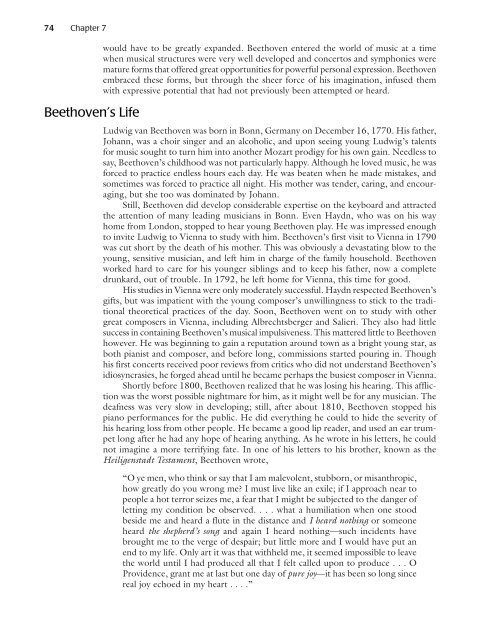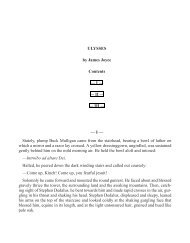Composer Profile - Activefolio
Composer Profile - Activefolio
Composer Profile - Activefolio
You also want an ePaper? Increase the reach of your titles
YUMPU automatically turns print PDFs into web optimized ePapers that Google loves.
74 Chapter 7<br />
Beethoven’s Life<br />
would have to be greatly expanded. Beethoven entered the world of music at a time<br />
when musical structures were very well developed and concertos and symphonies were<br />
mature forms that offered great opportunities for powerful personal expression. Beethoven<br />
embraced these forms, but through the sheer force of his imagination, infused them<br />
with expressive potential that had not previously been attempted or heard.<br />
Ludwig van Beethoven was born in Bonn, Germany on December 16, 1770. His father,<br />
Johann, was a choir singer and an alcoholic, and upon seeing young Ludwig’s talents<br />
for music sought to turn him into another Mozart prodigy for his own gain. Needless to<br />
say, Beethoven’s childhood was not particularly happy. Although he loved music, he was<br />
forced to practice endless hours each day. He was beaten when he made mistakes, and<br />
sometimes was forced to practice all night. His mother was tender, caring, and encouraging,<br />
but she too was dominated by Johann.<br />
Still, Beethoven did develop considerable expertise on the keyboard and attracted<br />
the attention of many leading musicians in Bonn. Even Haydn, who was on his way<br />
home from London, stopped to hear young Beethoven play. He was impressed enough<br />
to invite Ludwig to Vienna to study with him. Beethoven’s first visit to Vienna in 1790<br />
was cut short by the death of his mother. This was obviously a devastating blow to the<br />
young, sensitive musician, and left him in charge of the family household. Beethoven<br />
worked hard to care for his younger siblings and to keep his father, now a complete<br />
drunkard, out of trouble. In 1792, he left home for Vienna, this time for good.<br />
His studies in Vienna were only moderately successful. Haydn respected Beethoven’s<br />
gifts, but was impatient with the young composer’s unwillingness to stick to the traditional<br />
theoretical practices of the day. Soon, Beethoven went on to study with other<br />
great composers in Vienna, including Albrechtsberger and Salieri. They also had little<br />
success in containing Beethoven’s musical impulsiveness. This mattered little to Beethoven<br />
however. He was beginning to gain a reputation around town as a bright young star, as<br />
both pianist and composer, and before long, commissions started pouring in. Though<br />
his first concerts received poor reviews from critics who did not understand Beethoven’s<br />
idiosyncrasies, he forged ahead until he became perhaps the busiest composer in Vienna.<br />
Shortly before 1800, Beethoven realized that he was losing his hearing. This affliction<br />
was the worst possible nightmare for him, as it might well be for any musician. The<br />
deafness was very slow in developing; still, after about 1810, Beethoven stopped his<br />
piano performances for the public. He did everything he could to hide the severity of<br />
his hearing loss from other people. He became a good lip reader, and used an ear trumpet<br />
long after he had any hope of hearing anything. As he wrote in his letters, he could<br />
not imagine a more terrifying fate. In one of his letters to his brother, known as the<br />
Heiligenstadt Testament, Beethoven wrote,<br />
“O ye men, who think or say that I am malevolent, stubborn, or misanthropic,<br />
how greatly do you wrong me? I must live like an exile; if I approach near to<br />
people a hot terror seizes me, a fear that I might be subjected to the danger of<br />
letting my condition be observed. . . . what a humiliation when one stood<br />
beside me and heard a flute in the distance and I heard nothing or someone<br />
heard the shepherd’s song and again I heard nothing—such incidents have<br />
brought me to the verge of despair; but little more and I would have put an<br />
end to my life. Only art it was that withheld me, it seemed impossible to leave<br />
the world until I had produced all that I felt called upon to produce . . . O<br />
Providence, grant me at last but one day of pure joy—it has been so long since<br />
real joy echoed in my heart . . . .”



